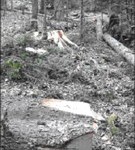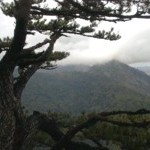By Nick Hawton
Sarajevo – Thousands of illegal loggers already end up in court in Bosnia
In the remote mountains and forests of Bosnia, the illegal traders are busy at work. Stripping down the country's most precious resource, wood, loading it on to lorries and selling it on to the highest bidder.
And it is big business. International investigators estimate that the Bosnian economy loses about $100m every year to through tax evasion and corruption in the industry.
In an effort to halt the trade, European Union peacekeepers in Bosnia have begun operations to try to clamp down on the illegal loggers.
"The collapse of the former Yugoslavia meant an end to any regulatory system," says Jure Sesar, the Bosnian Federation's Deputy Minister for Forestry.
"In the immediate aftermath of the 1992-5 war, it was natural that many people, especially refugees, would illegally cut down trees, either for firewood or to sell to try to make ends meet. But since then, more organised criminal groups have become involved.
"Last year alone there were more than 4,000 prosecutions for illegal logging."
'Easy money'  About 43% of the entire country is covered in forest. Wood and wood products are Bosnia's single biggest export. There is lots of money to be made.
About 43% of the entire country is covered in forest. Wood and wood products are Bosnia's single biggest export. There is lots of money to be made.
Inspectors are too few in number to keep proper checks
"The industry is riddled with corruption, from the lowest worker to the levels of top management. It even reaches political circles, where profit from the industry is used to pay off political favours," says one international investigator, who asked not to be named.
"It's really easy money with minimal costs involved.
"There is also environmental damage. Soil erosion can occur. And in places where the sawdust from illegal cutting is dumped, there is a real risk of fire."
One of the methods used by the illegal loggers is simply not to declare the wood that is chopped down. By law, every log must be stamped so that its history can be traced. But the illegal loggers either use false stamps or no stamps at all. The wood is then sold on, very often abroad to places like Italy and neighbouring Serbia.
To make control more difficult, there is no state-wide ministry that has control over the industry. Responsibility is divided between the two entities that make up post-war Bosnia-Hercegovina, the Muslim-Croat Federation and the Serb Republic.
There are too few inspectors on the ground to make sure the rules are being obeyed.
With millions of dollars pumped into Bosnia by the EU since the war ended a decade ago, there is frustration that revenue that could be earned by a Bosnian industry itself is being lost through tax evasion and corruption.
Peacekeepers' role
EU peacekeepers (Eufor) have decided to act.
Eufor has about 7,000 troops deployed in Bosnia
Helicopters with advance surveillance equipment are being used to track the illegal loggers. Random road checkpoints have been set up across the country to intercept wood lorries. Their loads are examined and papers checked.
"Illegal logging makes up a significant part of the endemic crime and corruption in this country which is depriving the government of much needed revenue," says Lt Col Bridget Rose of Eufor.
"One of our jobs is to bear down on these criminal networks and help to assist the border service, the local police and the tax agency."
Since Eufor took over from Nato-led peacekeepers at the end of last year, they have made a priority of trying to attack organised crime, in all its forms, across Bosnia. They believe tackling the problem in the logging industry will have further benefits.
"The criminal gangs involved in the logging business are often the same gangs involved in harbouring and protecting indicted war criminals," says Col Rose.
"By tackling the loggers, we can also make progress in this area as well."




